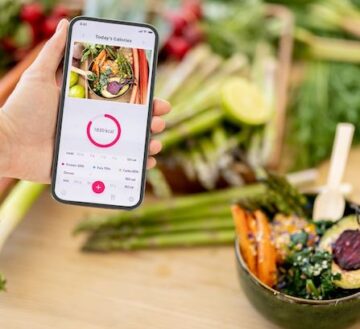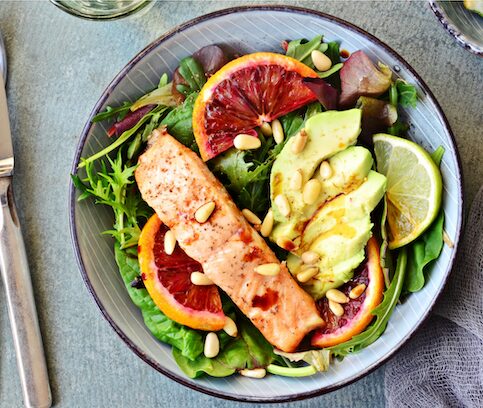Did You Know You Probably Need To Eat MORE To Lose Weight
– Here’s Why It’s Essential To Track Your Macros for at least 3 Days
It’s already almost the end of the first quarter of the year, how did that happen? How are those new year resolutions going? Do you remember what they were or what you decided was going to change this year for the better? If you do and you’re well on your way to crushing that resolution or goal, kudos, high five and a “atta boy” or “atta girl” to you! That’s awesome. If you don’t recall or simply decided you had more important things to do or focus on, don’t feel discouraged, life has its way of throwing us curveballs that make us readjust priorities.

Tracking your calories at least once will help you improve in more than one area of health and fitness this year.
I can’t tell you how valuable it will be to know what you’re eating – because trust me, it’s likely less than what you think in terms of calories, or macros – proteins, fats and carbs.
Now, when I say once, I’ll define what I mean here. ‘Once’ in the context of this blog will refer to tracking your calories for a minimum of 3 days and should include at least one day on the weekend (Ex. Thursday, Friday, Saturday).
This helps us get a sense of what your normal eating pattern looks like during the week when most people have regular schedules, plus one weekend day where eating habits might be somewhat different
In terms of how to track and what apps or programs to use, I’ll suggest some at the end, so for now, let’s get started!
5 Reasons To Track Your Calories
- Know How Much or How Little You’re Consuming On A Daily Basis
If you recall from my blog post, “The Slippery Slope of Under-Eating” there are a lot of people that under eat on a daily basis, sometimes up to 1,000 calories a day! Done over a long period of time, the body’s hormonal profile and modus operandi changes to survival mode by storing the calories it does get into fat and no amount of high intensity exercise will change that. Knowing if you’re consuming too little or too many calories each day can give you some insight into what actions need to be taken to ensure you’re getting the right quantity of energy, which is what food is. The breakdown of macronutrients is a key component to understanding how much or how little of certain foods you should be eating.

- Increase Awareness Around What Foods Will Fuel Your Body Properly
Once you understand the quantity of food you should be eating each day, the next step to look at food selection. Selecting the right foods can be crucial to getting just the right amount of energy you need to thrive. For example, your macronutrient profile may suggests that you need to eat 150 grams of protein minimum per day, but you also need to keep your fat below 100 grams per day.
(Side note – fat isn’t bad but if you eat more fat at the expense of lower carbs and protein you may not be getting the quality fuel you need). If you were doing 3 meals per day only, avoiding snacks, then you would need to ensure that you were getting at least 50 grams of protein at each meal.
The next question then is, “what foods would have a high protein quantity while keep the fat content low?” This would likely then lead you to researching leaner proteins like chicken, turkey and grass-fed/grass-finished beef, where the fat content is lower than say with grain finished beef, fattier cuts of meat like rib-eye’s, or highly processed sausages. That’s just one macronutrient! Imagine how your view of food would change based on researching carbs and fats!
- The More Data You Have Around The Food You Eat, The Better Choices You Can Make
The more data you uncover about how much you’re eating and which foods help you thrive to achieve your goals, the easier it can be to start recognizing the difference between good and poor food choices. Take the previous example about needing to keep your daily fat content to 100 grams or under each day so you get enough protein and carbs – this is something I have to focus on, it’s not just you. In my 3 day diet tracking I have the data that shows that breakfast one day was a total of 691 calories (31g protein, 105g carb, 21g fat) that consisted of 2oz of lean grass-fed ground beef, 1 cup cooked rice, 280g of organic sweet potato, and 8oz of chia pudding, while another day’s breakfast was 799 calories (26g protein, 60g carb, 44g fat) consisting of 2 beef empanadas, 16oz of egg scramble, and 2 protein muffins. (Remember, these examples are part of my own macro tracking, so bear in mind that your meals might not be as large as mine). Now you know that starting the day out with leaner meats, prioritizing protein and consuming items lower in fat can set you up of a more balanced day of nutrition, thereby allowing you to make better food choices in the future.
- Understanding What Your Body Needs To Thrive Is Empowering
You’re now empowering yourself to continue down the path of making choices that enrich your life. The data doesn’t lie… but if you don’t track you don’t know!
Understanding and eating healthy food is just the beginning of your journey to find out what else is possible to live the life you want. This knowledge can lead you to completely changing your social habits, how you spend your time, what you think is important and what you choose to share with others.

You’ve stopped going out until 2am and drinking on the weekends, opting to get to bed early so you can hit the gym and get in a hike to take advantage of the amazing weather. You join a survival skills class that meets every Saturday morning at 7am because you suddenly have the energy to get up early and pursue things that have interested you for a long time. All because you chose to have a better understanding about how food fuels you.
- Body Composition Changes Can Only Happen With Focused Attention To That Goal
One of the core values of REGENERATE Strength is that we believe commitment and personal responsibility yield the best results. This is certainly true with the desire for body composition changes. This final reason to give calorie tracking a try is to have the understanding that changes can only come with focused attention to a desired outcome. You have the power to make it happen, but sometimes some of us need a little push or to be steered the right direction. If you’re unsure where to start, hiring a Coach is a great first step in the process, and yes, remember, this is a process, a journey.

Finally, if you’re curious about how to track your calories just to see what you’re consuming on a daily basis, I would highly suggest the following, in order of my preference for use in terms of accuracy. Keep in mind that the data you use from these apps is only as good as the data that was input, usually by others, so if you’re going to track, make sure you weigh, measure and double check the food you’re tracking.
Cronometer. In my view, this is one of the best calorie tracking apps/programs out there. The company prides itself on being “the most accurate, comprehensive nutrition tracking app on earth.”
MyFitnessPal. This one has been around for a long time, has a lot of data that has been poured into it, so you’re likely to find pretty much anything you can think of while tracking your food. The downside is that you will get a lot inputs that might not be as accurate as you’d like them to be.
If you’re wanting to be 95+% accurate with your tracking, then I would use Cronometer, otherwise, MFP can suffice.
Onsite and Remote Coaching available! Click HERE to book your FREE 15min phone consult.
Until next time, this has been Coaches Corner with Coach Dave Downey of REGENERATE Strength






